- Home
- James Clavell
Whirlwind Page 38
Whirlwind Read online
Page 38
The young man trembled and began to mouth the words imprinted on him by a dozen mullahs reading from the Koran, then translating: “there to live forever with all sinners and the accursed People of the Left Hand, tasting neither refreshment nor any drink but boiling water or molten metal and decaying filth. And when the fires of hell have burned away the skin, they will grow new ones so that their suffering be never ending…”
He closed his eyes with the intensity of his prayers: Let me die with one of God’s names on my lips, and so guarantee that I will go straight to the Garden of Paradise with all the People of the Right Hand, to be there forever, never to feel hunger again, never to watch brothers and sisters of the villages with bloated bellies whimper into death, never to cry out in the night at the awfulness of life but to be in Paradise: “there to lie on silken couches adorned with robes of green silk, attended by fresh blooming youths bearing goblets and ewers and cups of flowing wine, with such fruits that please us best and the flesh of such birds as we shall long for. And ours shall be the houris with large dark eyes like pearls hidden in their shells, forever young, forever virgin, amid trees clad with fruit, and in extended shade and by flowing waters, never growing old, forev—”
The rifle butt pulverized his nose and caved in the front of his skull, permanently blinding him and ending forever his normality but not killing him before he tumbled unconscious into the snow. His assailant was a soldier, of an age with him, and this man hastily picked up the carbine—used it to break the lock of the flimsy door and shove it open.
“Hurry,” the assailant whispered, sweating with fear. In a moment General Valik poked his head out cautiously. The man grabbed his arm. “Come on, hurry, by God,” he snarled.
“May God bless you…” Valik said, his teeth chattering, then darted back and came out again with two huge bundles of rials that the man stuffed into his battle dress and vanished as silently as he had arrived. Valik hesitated a moment, his heart driving. He saw the carbine in the snow and picked it up, loaded it, and slung it over his shoulder, then grabbed up the attaché case, blessing God that the revolutionaries had been too hasty in their search to discover its false bottom before they were shoved in here to await the coming of the Tribunals.
“Follow me,” he whispered urgently to his family. “But in the Name of God make no noise. Follow me carefully.” He pulled his coat closer around him and led the way through the snow. His wife, Annoush, his eight-year-old son, Jalal, and his daughter Setarem, six, hesitated in the doorway. All wore ski clothes—Annoush a mink over hers that the Islamic Guards had taunted her about as an open representation of the wages of sin. “Keep it with you,” they had said contemptuously, “that alone damns you!” In the night she had been happy for its warmth, huddled on the dirt floor in the unheated shed, wrapping the children in it. “Come along, my darlings,” she whispered, trying to keep her terror from them.
The sentry’s body blocked their way as he lay in the snow, moaning softly.
“Mama, why does he sleep in the snow?” the little girl asked in a whisper.
“Never mind, my darling. Let’s hurry. Not a sound now!”
Silently she stepped over him. The little girl could not quite make it and had to tread on him, and she stumbled, sprawling in the snow. But she did not cry out, just scrambled to her feet helped by her brother. Together, hand in hand, they hurried onward.
Valik guided them carefully. When they reached the hangar where the 212 was still parked, he breathed a little easier.
This area was well away from the main camp, the other side of the enormous runway. Making sure there were no guards nearby he ran out to the chopper and peered into the cabin. To his enormous relief no guards were asleep inside. He tried the door. It was not locked. He slid it open as quietly as he could, and beckoned the others. Silently they joined him. He helped them up and got in after them, sliding the door to, locking it from the inside. Quickly he made the children comfortable on some blankets under the jump seats, cautioning them not to make their presence known whatever happened. Then he sat beside his wife, wrapped a blanket around his shoulders, for he was very cold, and held her hand. The tears wet her cheeks.
“Be patient, don’t cry. It won’t be long now,” he whispered, gentling her. “We won’t have to wait long. Insha’Allah.”
“Insha’Allah,” she echoed brokenly, “but the whole world’s gone mad…thrown into a filthy outhouse like criminals…what’s going to happen to us…”
“With the Help of God we’ve got this far, so why not all the way to Kuwait?”
They had arrived here yesterday just before noon. The flight from the pickup outside of Tehran had been without incident, all airwaves silent. His trusted chauffeur of fifteen years had driven his car back to Tehran, with orders to tell no one that they had “gone to their house on the Caspian.”
“In this escape we trust no one,” Valik had told his wife while they were waiting for the chopper to arrive.
She had said, “Of course, but we should have brought Sharazad, that would have helped her and Tom Lochart and guaranteed he would take us onward.”
“No, she’d never have left, why should she?” Valik had said. “With or without Sharazad, he is not to be trusted—he’s alien and not one of us.”
“It would have been wiser to have brought her.”
“No,” he had said, knowing what would have to be done with Lochart.
All the way from Tehran to Isfahan he had sat in the front with Lochart. They had stayed low, avoiding towns and airfields. When Lochart had called Isfahan Military Base Control they were obviously expected. The tower had given them directions where to land with an order not to call again and to observe radio silence. Air Force Brigadier General Mohammed Seladi, Valik’s uncle, who had arranged for them to land and to refuel, met them at the helipad. The general had greeted them somberly. As it was near lunchtime he said they should eat on the base before going on.
“But, Mohammed Excellency, we’ve enough food here on the aircraft,” Valik had told him.
“I must insist,” Seladi had said nervously, “I must insist, Excellency. You should pay your respects to the commandant. It is necessary, and, er, we must talk.”
It was during this time that the Green Bands and the mob had burst through the gates, swarmed over the station, arrested them all, and had taken Lochart to another part of the base. Sons of dogs, Valik thought angrily, may they all burn in hell! I knew at the time we should have just refueled and gone on at once. Seladi’s a blundering fool. It’s all his fault…
In an upper story of a barrack a quarter of a mile away. Tom Lochart was sleeping fitfully. Suddenly he was awakened by a scuffle outside in the corridor, the door burst open, and he was half blinded by a flashlight.
“Quick,” a voice said in American English and two men helped him stand. At once the two half-seen figures turned and ran off. A split second to collect himself then Lochart rushed in pursuit, along the corridor, down three flights of stairs, and into the open. There he stopped with the others, his breathing heavy. He just had time to see that both men were officers, a captain and a major, before they were off again in the semidarkness, running hard. Dawn brightened the eastern sky. Snow fell lightly, helping to hide them, and muffling their footsteps.
Ahead was a guardhouse with a wood fire outside, a few sleepy inattentive revolutionaries huddled around it. The three men diverted and ran down between a line of barracks, diverted again into an alleyway as a truck filled with chanting guards came around a corner, then rushed into the open, along the boundary road for the far hangar and the 212. In the lee of the hangar, they stopped to catch their breath.
“Listen, pilot,” the major said, panting, “when I give the word, we run for the chopper and take off. Ready?”
“What about the others?” Lochart asked, a stitch in his side and hardly able to talk. “What about General Valik and his fam—”
“Forget them. Ali,” the major jerked his thumb at the othe
r man, “Ali goes in front with you and I’m in the back. How long will it take to get airborne once you start up?”
“Minimum.”
“Make it less,” the major said. “Come on!”
They rushed for the 212, Lochart and Ali, the captain, heading for the cockpit. At that moment Lochart saw a car without headlights charging along the boundary road toward them and his heart seemed to stop. “Look!”
“In God’s name, hurry, pilot!”
Lochart redoubled his efforts, jumped into the pilot’s seat, shoved in the circuit breakers, switched on, and began to crank her up. At the same moment the major reached the sliding door and tore it open. He almost fainted when the carbine was shoved in his face by Valik.
“Oh, it’s you, Major! Praise be to God…”
“Praise be to God you’re here and made your escape, Excellency,” the major gasped, forced his panic away, and clambered in, the engines already winding the blades but nowhere near airspeed yet. “Praise be to God you made your escape…but where’s the soldier?”
“He just took the money and fled.”
“Did he bring the guns?”
“No, this is all h—”
“Son of a dog!” the major said furiously, then shouted at Lochart, “In the Name of God hurryyyyyyy!” He whirled and looked at the approaching car. It was closing fast. He grabbed the carbine from Valik, kneeled in the doorway, aimed at the driver, and squeezed the trigger. The burst was high—as behind him Annoush and the children cried out in terror—the car hurtled off the road taking evading action and swung behind a row of sheds, came into view for an instant to dart around the hangar and disappear again.
Lochart had his headset on and was watching the needles climbing, willing them to hurry. “Come on, goddamnit,” he muttered, hands and feet ready on the controls, the scream of the jets growing, the captain beside him praying openly. He could not hear Annoush sobbing in the back or the petrified children who had scrambled out of their hiding place to bury themselves in her skirts, or Valik and the major raging at him to hurry.
Needles climbing. Still climbing. Still climbing. Almost in the Green. Now! His left hand started to raise the collective lever but the car whirled around the hangar and came at them head-on to stop fifteen yards away. Five men jumped out of it—one rushed directly at the cockpit and pointed an automatic rifle at him, the others went for the cabin door. He was almost airborne but knew he was a dead man if he went the extra inches and he saw the man angrily motion him to stop. He obeyed, then swung around to look into the back. The other men were clambering in. They were all officers, Valik and the major were embracing them and being embraced, then he heard, “Take off, for crissake!” in his headset and felt a shove in the ribs. It was Ali, the captain, beside him.
“Take off!” Ali said again, his English American-accented, and gave a thumbs-up to the man outside still aiming at them. The man rushed for the door, got in, and slammed the door closed. “Hurry, goddamnit, look over there!” He pointed at the other side of the runway More cars were heading their way. Sparks of machine-gun fire from someone leaning out of a window. In seconds Lochart was airborne, all senses concentrating on escape.
Behind him some of the officers cheered, hung on as the chopper took evading action, and sorted themselves into seats. Most were colonels. Some were shaken, particularly General Seladi who sat between Valik and the major. “I wasn’t sure it was you, General Excellency,” the major was saying, “so I fired high just as a warning. Praise be to God the plan worked so well.”
“But you were going to take off. You were going to leave us! You w—”
“Oh, no, Excellency Uncle,” Valik interrupted smoothly, “it was the British pilot, he was panicking and didn’t want to wait! They’ve no balls, Britishers! Never mind him,” he added, “we’re armed, we’ve food, and we’re safe! Praise be to God! And more praise that I had time to plan.” Yes, he thought, if it hadn’t been for me and my money we’d all be dead—money to bribe the man who released us and you, and the major and captain to release Lochart whom I need just a little longer.
“If we’d been left we’d’ve been shot!” General Seladi was enraged, his face purple. “God curse that pilot to hell! Why did you waste time releasing him? Ali can fly a 212!”
“Yes. But Lochart has more experience and we need him to get through the maze,”
Valik smiled encouragingly at Annoush who sat across the aisle facing him, the little girl trembling in her arms, his son sitting on the floor dozing, his head in her lap. Weakly she smiled back, shifting the weight of the child to ease the aches that pervaded her. He reached over and touched her, then settled more comfortably in his seat and closed his eyes, very tired but most content. You’re a very clever man, he told himself. In his most secret heart he knew that without his stratagem of pretending to McIver that SAVAK was going to arrest him—and particularly his family—neither McIver nor Lochart would have helped them to escape. You measured them perfectly as you have Gavallan.
Fools! he thought contemptuously.
And as for you, Seladi, my stupid and rapacious uncle who bartered safe refueling at Isfahan—which you failed to provide—in return for a safe passage out for yourself and eleven of your friends, you’re worse. You’re a traitor. If I hadn’t had an informant of long standing in the General Staff HQ I would never have heard of the generals’ great betrayal in time to escape and we’d’ve been caught like flies in a honey pot in Tehran. Loyalists may still prevail, the battle’s not lost yet, but meanwhile my family and I will watch events from England, St. Moritz, or New York.
He let himself go into the exciting, wonderful power of the jets that were carrying them to safety, to a house in London, a country house in Surrey, another in California, and to Swiss and Bahamian bank accounts. Ah, yes, he told himself happily, and that reminds me about our blocked S-G joint account in the Bahamas, another $4 million to enrich us—and easy now to pry from Gavallan’s grubby paws. More than enough to keep me and my family safe whatever happens here—until we can return. Khomeini won’t live forever even if he wins—God curse him! Soon we’ll be able to return home, soon Iran will be normal again, meanwhile we have everything we need.
His ears heard Seladi still muttering about Lochart and almost being left behind. “Calm yourself, Excellency,” he said, and took his arm, gentling him, and thought, You and your running dogs still have a value, a temporary value. Perhaps as hostages, perhaps as bait—who knows? None are family except you and you betrayed us. “Calm yourself, my revered uncle, with the Help of God the pilot will get what he deserves.”
Yes. Lochart should not have panicked. He should have waited for my order. Disgusting to panic.
Valik closed his eyes and slept, very satisfied with himself.
AT THE IRAN-TODA REFINERY, BANDAR DELAM: 12:04 P.M. Scragger was whistling tonelessly, hand-pumping fuel into his main tanks from big barrels that were lined up in a small Japanese semi beside the freshly washed 206, sparkling in the sun. Nearby was a young Green Band who squatted in the shade, leaning on his M16, half asleep.
The noonday sun was warm and the light breeze made the day pleasant and took away the constant humidity, here on the coast. Scragger was dressed lightly, white shirt with captain’s epaulets, summer-weight black trousers and shoes, the inevitable dark glasses and peaked cap.
Now the tanks were brimming. “That’s it, me son,” he said to the Japanese assigned to assist him.
“Hai, Anjin-san”—Yes, Mr. Pilot—the man said. Like all employees at the refinery he wore white, spotless overalls and gloves, with Iran-Toda Industries emblazoned on the back, then the same thing in Farsi politely above, with equivalent in Japanese characters beneath it.
“Hai, it is,” Scragger said, using one of the words that he had picked up from Kasigi en route from Lengeh yesterday. He pointed. “Next our long-range tanks, and then we’ll fill the spares.” For the journey that de Plessey had grandly authorized Sunday night—to celebrate their
victory over the saboteurs—Scragger had taken out the backseat and lashed in place two 40-gallon drums, “just in case, Mr. Kasigi. I’ve connected them to the main tanks. We can use a hand pump and can even refuel in the air, if we have to—if you do the pumping. Now we won’t have to land for fuel. You can never tell with weather in the Gulf, there’s always sudden storms or squalls, fog, winds can play tricks. Our best bet’s to stay a little out to sea.”
“And Jaws?”
Scragger had laughed with him. “The old hammerhead of Kharg? With any luck we might see him—if we get that far and don’t get diverted.”
“Still no callback from Kish radar?”
“No, but it doesn’t matter. They’ve cleared us to Bandar Delam. You’re sure you can refuel me at your plant?”
“Yes, we’ve storage tanks, Captain. Helipads, hangar, and repair shop. Those were the first things we built—we had a contract with Guerney.”
“Yes, yes, I knew about that, but they’ve quit, haven’t they?”
“Yes, they did, a week or so ago. Perhaps your company would take over the contract? Perhaps you could be put in charge—there’s work for three 212s and perhaps two 206s constantly, while we’re building.”
Scragger had chuckled. “That’d make old Andy and Gav happy as a cat in a barrel of fish sticks and Dirty Dunc fart dust!”
“Please?”
Scragger tried to explain the joke about McIver. But when he was through Kasigi had not laughed, just said. Oh, now I understand.
They’re a rum lot, Scragger thought.
When he finished refueling he did another ground check—engine, rotors, airframe—though he did not expect to leave today. De Plessey had asked him to wait for Kasigi, to fly him where he needed to go, and to bring him back to Lengeh on Thursday. The 206 checked out perfectly. Satisfied he glanced at his watch, then he pointed at his stomach and rubbed it. “Grub time, hai?”

 Gai-Jin
Gai-Jin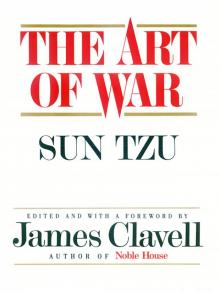 The Art of War
The Art of War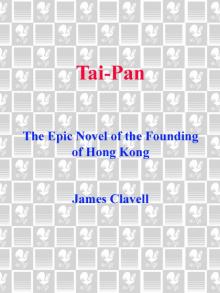 Tai-Pan
Tai-Pan Noble House
Noble House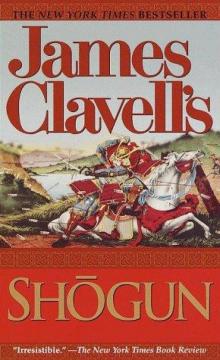 Shōgun
Shōgun Whirlwind
Whirlwind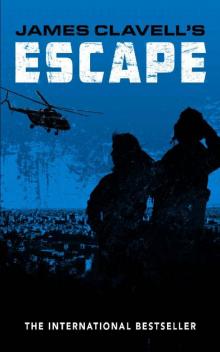 Escape
Escape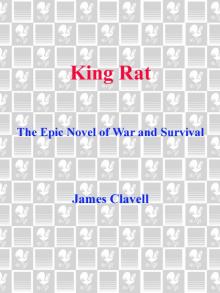 King Rat
King Rat The Children's Story
The Children's Story